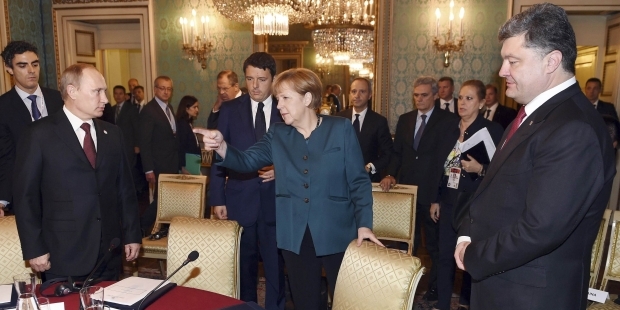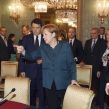
Ukraine in a Leaderless Europe: A Net Assessment (Part One)
Publication: Eurasia Daily Monitor Volume: 12 Issue: 47
By:

Russia’s war against Ukraine has exposed the deepening cracks in Europe’s understanding of itself as the West’s core, and in its positioning vis-à-vis an openly adverse Russia. Fragmentation processes were ongoing in Europe prior to this war, both above and (with longer-term effects) below the surface of European external policies. Russia’s successfully conducted war in Ukraine—as reflected in the Minsk Two “armistice”—exploits Europe’s growing incoherence. Basically, Moscow and Berlin worked out Minsk Two, at heavy costs to Ukraine, while European institutions looked paralyzed. It is to a dysfunctional Europe that the Barack Obama administration has downloaded its own share of responsibility for dealing with Russia’s war in Ukraine.
US policies had unwittingly contributed to Europe’s strategic involution, now seen over Ukraine. The United States alternated between a wrongly focused engagement with Europe (e.g., mobilization for protracted expeditionary wars) and partial disengagement from European security policy (removal of conventional-force deterrence, the failed “reset” with Russia). All this undermined US capacity for setting or influencing European foreign and defense policies. Inadvertently, it removed the US brakes from Europe’s own processes of fragmentation and drift. Meanwhile, Russia’s war against Ukraine has brought those processes compellingly to light (see Part Two).
The Kremlin, however, aims beyond Ukraine. It aims for European consent and even cooperation to establish a Russian sphere of influence in Europe’s eastern neighborhood, as part of an overall European settlement. Reversing the post-1991 settlement, the new one should empower Russia to participate “on an equal basis” in decision-making on all European security and economic affairs. A deal between Russia and Europe at Ukraine’s expense (were it to develop from the Russo-German Minsk Two nutshell) could mark the start of the above-described process in Europe. This would enable a remilitarized Russia to intimidate a demilitarizing Europe, participate in European policies in order to subvert them, splinter the Europeans against themselves, and decouple Europe from the United States.
Russia regards Ukraine as the possible laboratory of a new European security model. Russia and Germany (preferably with some European player in Germany’s tow) would jointly handle security issues in Europe’s East, bypassing or pre-empting the European Union’s or the North Atlantic Treaty Organization’s (NATO) common policies. The “Normandy Group,” which is handling the “Ukrainian conflict” (Russia, Germany, France, Ukraine), is the current tool in this experiment.
This format in and of itself undermines the European and Euro-Atlantic institutions. In their stead it introduces a West-European sub-group (Germany and France) while awarding Russia the decision-making powers that Russia does not enjoy in the existing institutions such as the EU and NATO.
The “Normandy” format could only have taken shape amid the leadership vacuum in Europe at this time. Russia is exploiting that vacuum in its own interests through this group. Germany is using this format as an antechamber from which to usher Russia into European decision-making processes—a vision of Ostpolitik.
Russia and Germany are calling the tune in the “Normandy” quartet; France looks pleased to be cast even as second fiddle behind Germany; and Ukraine is captive to the consensus worked out by the three powers on terms favoring Russia. Successive “Normandy Group” meetings have demonstrated how this mechanism operates at the heads of state/heads of government level and the ministerial level. Moscow and Berlin initiate joint proposals; Paris is consulted and agrees; they present their proposal to Kyiv (which faces the fait accompli); and they have the proposal endorsed publicly by the “Normandy Group.” The result is then referred variously to the EU, Organization for Security and Cooperation in Europe (OSCE) or the United Nations Security Council for approval. Their formal imprints are sought in order to legitimize those decisions post factum (see EDM, February 23).
The results include, thus far (in chronological order): unilateral Ukrainian ceasefires; legitimization of the Donetsk and Luhansk “people’s republics” through the Contact Group and the Minsk agreements, in turn legitimizing the partition de facto of Ukraine’s east; constitutional changes demanded of Ukraine as pre-conditions to Russia’s implementation of the Minsk Two “armistice”; passive acceptance of the Russian grab of Debaltseve; rejection of Kyiv’s proposals to replace or supplement the ineffective OSCE mission with an EU or a UN mission (see EDM, July 3, 2014; July 10, 2014; July 18, 2014; September 8, 2014; January 23, 2015; February 27, 2015).
Beyond conflict management and armistice terms, however, the “Normandy Group” is pre-empting the EU’s association policy and NATO’s open door policy. It is in the Normandy forum that Russia, Germany and France have prevailed on Ukraine to insert Russia into re-negotiating the EU-Ukraine free trade agreement. This concession became a component of the Minsk armistice package (see Part Two). And despite Ukraine’s national choice, the Russo-German-French consensus holds that Ukraine must renounce the goal of NATO membership, reinstating a “nonaligned” status, as part of an overall European settlement with Russia. Beyond Ukraine’s case, such restrictions set worrisome precedents for Georgia and Moldova in terms of their own national choices.




